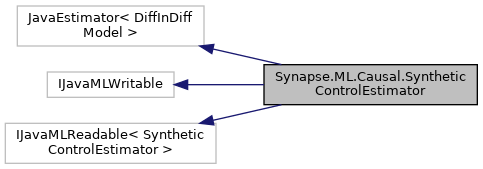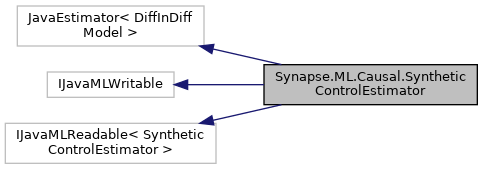SyntheticControlEstimator implements SyntheticControlEstimator More...


Public Member Functions | |
| SyntheticControlEstimator () | |
| Creates a SyntheticControlEstimator without any parameters. More... | |
| SyntheticControlEstimator (string uid) | |
| Creates a SyntheticControlEstimator with a UID that is used to give the SyntheticControlEstimator a unique ID. More... | |
| SyntheticControlEstimator | SetEpsilon (double value) |
| Sets value for epsilon More... | |
| SyntheticControlEstimator | SetHandleMissingOutcome (string value) |
| Sets value for handleMissingOutcome More... | |
| SyntheticControlEstimator | SetLocalSolverThreshold (long value) |
| Sets value for localSolverThreshold More... | |
| SyntheticControlEstimator | SetMaxIter (int value) |
| Sets value for maxIter More... | |
| SyntheticControlEstimator | SetNumIterNoChange (int value) |
| Sets value for numIterNoChange More... | |
| SyntheticControlEstimator | SetOutcomeCol (string value) |
| Sets value for outcomeCol More... | |
| SyntheticControlEstimator | SetPostTreatmentCol (string value) |
| Sets value for postTreatmentCol More... | |
| SyntheticControlEstimator | SetStepSize (double value) |
| Sets value for stepSize More... | |
| SyntheticControlEstimator | SetTimeCol (string value) |
| Sets value for timeCol More... | |
| SyntheticControlEstimator | SetTol (double value) |
| Sets value for tol More... | |
| SyntheticControlEstimator | SetTreatmentCol (string value) |
| Sets value for treatmentCol More... | |
| SyntheticControlEstimator | SetUnitCol (string value) |
| Sets value for unitCol More... | |
| double | GetEpsilon () |
| Gets epsilon value More... | |
| string | GetHandleMissingOutcome () |
| Gets handleMissingOutcome value More... | |
| long | GetLocalSolverThreshold () |
| Gets localSolverThreshold value More... | |
| int | GetMaxIter () |
| Gets maxIter value More... | |
| int | GetNumIterNoChange () |
| Gets numIterNoChange value More... | |
| string | GetOutcomeCol () |
| Gets outcomeCol value More... | |
| string | GetPostTreatmentCol () |
| Gets postTreatmentCol value More... | |
| double | GetStepSize () |
| Gets stepSize value More... | |
| string | GetTimeCol () |
| Gets timeCol value More... | |
| double | GetTol () |
| Gets tol value More... | |
| string | GetTreatmentCol () |
| Gets treatmentCol value More... | |
| string | GetUnitCol () |
| Gets unitCol value More... | |
| override DiffInDiffModel | Fit (DataFrame dataset) |
| Fits a model to the input data. More... | |
| void | Save (string path) |
| Saves the object so that it can be loaded later using Load. Note that these objects can be shared with Scala by Loading or Saving in Scala. More... | |
| JavaMLWriter | Write () |
| |
| JavaMLReader< SyntheticControlEstimator > | Read () |
| Get the corresponding JavaMLReader instance. More... | |
Static Public Member Functions | |
| static SyntheticControlEstimator | Load (string path) |
| Loads the SyntheticControlEstimator that was previously saved using Save(string). More... | |
Detailed Description
Constructor & Destructor Documentation
◆ SyntheticControlEstimator() [1/2]
|
inline |
Creates a SyntheticControlEstimator without any parameters.
◆ SyntheticControlEstimator() [2/2]
|
inline |
Creates a SyntheticControlEstimator with a UID that is used to give the SyntheticControlEstimator a unique ID.
- Parameters
-
uid An immutable unique ID for the object and its derivatives.
Member Function Documentation
◆ Fit()
| override DiffInDiffModel Synapse.ML.Causal.SyntheticControlEstimator.Fit | ( | DataFrame | dataset | ) |
Fits a model to the input data.
- Parameters
-
dataset The DataFrame to fit the model to.
- Returns
- DiffInDiffModel
◆ GetEpsilon()
| double Synapse.ML.Causal.SyntheticControlEstimator.GetEpsilon | ( | ) |
Gets epsilon value
- Returns
- epsilon: This value is added to the weights when we fit the final linear model for SyntheticControlEstimator and SyntheticDiffInDiffEstimator in order to avoid zero weights.
◆ GetHandleMissingOutcome()
| string Synapse.ML.Causal.SyntheticControlEstimator.GetHandleMissingOutcome | ( | ) |
Gets handleMissingOutcome value
- Returns
- handleMissingOutcome: How to handle missing outcomes. Options are skip (which will filter out units with missing outcomes), zero (fill in missing outcomes with zero), or impute (impute with nearest available outcomes, or mean if two nearest outcomes are available)
◆ GetLocalSolverThreshold()
| long Synapse.ML.Causal.SyntheticControlEstimator.GetLocalSolverThreshold | ( | ) |
Gets localSolverThreshold value
- Returns
- localSolverThreshold: threshold for using local solver on driver node. Local solver is faster but relies on part of data being collected on driver node.
◆ GetMaxIter()
| int Synapse.ML.Causal.SyntheticControlEstimator.GetMaxIter | ( | ) |
Gets maxIter value
- Returns
- maxIter: maximum number of iterations (>= 0)
◆ GetNumIterNoChange()
| int Synapse.ML.Causal.SyntheticControlEstimator.GetNumIterNoChange | ( | ) |
Gets numIterNoChange value
- Returns
- numIterNoChange: Early termination when number of iterations without change reached.
◆ GetOutcomeCol()
| string Synapse.ML.Causal.SyntheticControlEstimator.GetOutcomeCol | ( | ) |
Gets outcomeCol value
- Returns
- outcomeCol: outcome column
◆ GetPostTreatmentCol()
| string Synapse.ML.Causal.SyntheticControlEstimator.GetPostTreatmentCol | ( | ) |
Gets postTreatmentCol value
- Returns
- postTreatmentCol: post treatment indicator column
◆ GetStepSize()
| double Synapse.ML.Causal.SyntheticControlEstimator.GetStepSize | ( | ) |
Gets stepSize value
- Returns
- stepSize: Step size to be used for each iteration of optimization (> 0)
◆ GetTimeCol()
| string Synapse.ML.Causal.SyntheticControlEstimator.GetTimeCol | ( | ) |
Gets timeCol value
- Returns
- timeCol: Specify the column that identifies the time when outcome is measured in the panel data. For example, if the outcome is measured daily, this column could be the Date column.
◆ GetTol()
| double Synapse.ML.Causal.SyntheticControlEstimator.GetTol | ( | ) |
Gets tol value
- Returns
- tol: the convergence tolerance for iterative algorithms (>= 0)
◆ GetTreatmentCol()
| string Synapse.ML.Causal.SyntheticControlEstimator.GetTreatmentCol | ( | ) |
Gets treatmentCol value
- Returns
- treatmentCol: treatment column
◆ GetUnitCol()
| string Synapse.ML.Causal.SyntheticControlEstimator.GetUnitCol | ( | ) |
Gets unitCol value
- Returns
- unitCol: Specify the name of the column which contains an identifier for each observed unit in the panel data. For example, if the observed units are users, this column could be the UserId column.
◆ Load()
|
static |
Loads the SyntheticControlEstimator that was previously saved using Save(string).
- Parameters
-
path The path the previous SyntheticControlEstimator was saved to
- Returns
- New SyntheticControlEstimator object, loaded from path.
◆ Read()
| JavaMLReader<SyntheticControlEstimator> Synapse.ML.Causal.SyntheticControlEstimator.Read | ( | ) |
Get the corresponding JavaMLReader instance.
- Returns
- an JavaMLReader<SyntheticControlEstimator> instance for this ML instance.
◆ Save()
| void Synapse.ML.Causal.SyntheticControlEstimator.Save | ( | string | path | ) |
Saves the object so that it can be loaded later using Load. Note that these objects can be shared with Scala by Loading or Saving in Scala.
- Parameters
-
path The path to save the object to
◆ SetEpsilon()
| SyntheticControlEstimator Synapse.ML.Causal.SyntheticControlEstimator.SetEpsilon | ( | double | value | ) |
Sets value for epsilon
- Parameters
-
value This value is added to the weights when we fit the final linear model for SyntheticControlEstimator and SyntheticDiffInDiffEstimator in order to avoid zero weights.
- Returns
- New SyntheticControlEstimator object
◆ SetHandleMissingOutcome()
| SyntheticControlEstimator Synapse.ML.Causal.SyntheticControlEstimator.SetHandleMissingOutcome | ( | string | value | ) |
Sets value for handleMissingOutcome
- Parameters
-
value How to handle missing outcomes. Options are skip (which will filter out units with missing outcomes), zero (fill in missing outcomes with zero), or impute (impute with nearest available outcomes, or mean if two nearest outcomes are available)
- Returns
- New SyntheticControlEstimator object
◆ SetLocalSolverThreshold()
| SyntheticControlEstimator Synapse.ML.Causal.SyntheticControlEstimator.SetLocalSolverThreshold | ( | long | value | ) |
Sets value for localSolverThreshold
- Parameters
-
value threshold for using local solver on driver node. Local solver is faster but relies on part of data being collected on driver node.
- Returns
- New SyntheticControlEstimator object
◆ SetMaxIter()
| SyntheticControlEstimator Synapse.ML.Causal.SyntheticControlEstimator.SetMaxIter | ( | int | value | ) |
Sets value for maxIter
- Parameters
-
value maximum number of iterations (>= 0)
- Returns
- New SyntheticControlEstimator object
◆ SetNumIterNoChange()
| SyntheticControlEstimator Synapse.ML.Causal.SyntheticControlEstimator.SetNumIterNoChange | ( | int | value | ) |
Sets value for numIterNoChange
- Parameters
-
value Early termination when number of iterations without change reached.
- Returns
- New SyntheticControlEstimator object
◆ SetOutcomeCol()
| SyntheticControlEstimator Synapse.ML.Causal.SyntheticControlEstimator.SetOutcomeCol | ( | string | value | ) |
Sets value for outcomeCol
- Parameters
-
value outcome column
- Returns
- New SyntheticControlEstimator object
◆ SetPostTreatmentCol()
| SyntheticControlEstimator Synapse.ML.Causal.SyntheticControlEstimator.SetPostTreatmentCol | ( | string | value | ) |
Sets value for postTreatmentCol
- Parameters
-
value post treatment indicator column
- Returns
- New SyntheticControlEstimator object
◆ SetStepSize()
| SyntheticControlEstimator Synapse.ML.Causal.SyntheticControlEstimator.SetStepSize | ( | double | value | ) |
Sets value for stepSize
- Parameters
-
value Step size to be used for each iteration of optimization (> 0)
- Returns
- New SyntheticControlEstimator object
◆ SetTimeCol()
| SyntheticControlEstimator Synapse.ML.Causal.SyntheticControlEstimator.SetTimeCol | ( | string | value | ) |
Sets value for timeCol
- Parameters
-
value Specify the column that identifies the time when outcome is measured in the panel data. For example, if the outcome is measured daily, this column could be the Date column.
- Returns
- New SyntheticControlEstimator object
◆ SetTol()
| SyntheticControlEstimator Synapse.ML.Causal.SyntheticControlEstimator.SetTol | ( | double | value | ) |
Sets value for tol
- Parameters
-
value the convergence tolerance for iterative algorithms (>= 0)
- Returns
- New SyntheticControlEstimator object
◆ SetTreatmentCol()
| SyntheticControlEstimator Synapse.ML.Causal.SyntheticControlEstimator.SetTreatmentCol | ( | string | value | ) |
Sets value for treatmentCol
- Parameters
-
value treatment column
- Returns
- New SyntheticControlEstimator object
◆ SetUnitCol()
| SyntheticControlEstimator Synapse.ML.Causal.SyntheticControlEstimator.SetUnitCol | ( | string | value | ) |
Sets value for unitCol
- Parameters
-
value Specify the name of the column which contains an identifier for each observed unit in the panel data. For example, if the observed units are users, this column could be the UserId column.
- Returns
- New SyntheticControlEstimator object
The documentation for this class was generated from the following file:
- synapse/ml/causal/SyntheticControlEstimator.cs
 1.8.17
1.8.17